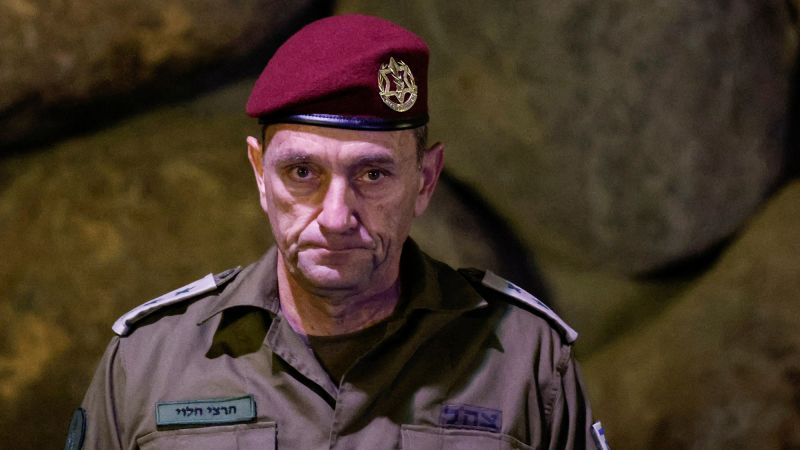Israeli Military Chief's Resignation: October 7 Attack Fallout

Israeli Military Chief's Resignation: October 7 Attack Fallout. Discover more detailed and exciting information on our website. Click the link below to start your adventure: Visit Best Website. Don't miss out!
Table of Contents
Israeli Military Chief's Resignation: Fallout from October 7th Hamas Attack Rocks Nation
Israel is reeling following the devastating October 7th Hamas attack, and the shockwaves continue to reverberate through the nation's leadership. In a dramatic turn of events, Israeli military chief Lieutenant General Herzi Halevi announced his resignation on October 26th, just weeks after the unprecedented assault. While the official statement cited personal reasons, analysts widely believe the resignation is inextricably linked to the intense scrutiny surrounding the military's response to the Hamas attack. This unprecedented act of aggression and the subsequent fallout have shaken the foundations of Israeli national security, leading to a period of intense introspection and re-evaluation.
Keywords: Herzi Halevi resignation, Israeli military chief resignation, October 7th Hamas attack, Israel Hamas war, Israeli military response, IDF response, Israeli national security, military leadership crisis, Israel defense forces
The October 7th Attack: A Turning Point
The October 7th Hamas attack was a watershed moment in the Israeli-Palestinian conflict. The scale and brutality of the assault, which involved a coordinated ground invasion and rocket barrage, caught Israeli intelligence agencies largely off guard. The attack resulted in hundreds of Israeli casualties and sparked a brutal retaliatory response from the Israel Defense Forces (IDF).
- Massive Casualties: The attack left hundreds of Israelis dead and many more wounded, making it the deadliest single incident in Israel's history since the 1973 Yom Kippur War.
- Intelligence Failures: The scale of the Hamas operation exposed significant gaps in Israeli intelligence gathering and assessment. This is a key area of intense debate and investigation following the attack.
- Ground Invasion: The unprecedented ground assault by Hamas fighters added a completely new dimension to the conflict, highlighting the vulnerabilities of Israeli settlements near the Gaza Strip.
Halevi's Resignation: A Symbol of Accountability?
While the official statement cites personal reasons for Lieutenant General Halevi's departure, the timing and context are undeniable. The intense criticism leveled against the IDF's response to the October 7th attack has created a climate of intense pressure on military leadership. Questions remain unanswered regarding:
- Intelligence Failures: Did the IDF have sufficient warning of the impending attack? What measures are being taken to improve intelligence gathering and analysis?
- Operational Effectiveness: Were IDF responses sufficiently swift and effective in containing the initial wave of attacks? Were resources adequately deployed?
- Strategic Miscalculations: Did strategic miscalculations contribute to the scale of damage inflicted by Hamas?
What Happens Next? The Road Ahead for Israeli National Security
The resignation of the IDF chief marks a significant moment of uncertainty for Israel. The nation is grappling with the aftermath of the October 7th attack, facing crucial questions about its national security apparatus and its strategic direction. The appointment of Halevi's successor will be a crucial step in rebuilding public confidence and reassessing security protocols. This process will undoubtedly involve rigorous internal investigations and a comprehensive review of Israel’s defense strategies.
The upcoming weeks and months will be critical for Israel as it navigates this period of profound change and uncertainty. The nation’s focus will be on rebuilding, strengthening its defenses, and ensuring that such a devastating attack never happens again. The international community is watching closely as Israel navigates this critical juncture. This ongoing situation warrants continuous monitoring and updates. Stay informed by checking back for future updates on this developing story.

Thank you for visiting our website wich cover about Israeli Military Chief's Resignation: October 7 Attack Fallout. We hope the information provided has been useful to you. Feel free to contact us if you have any questions or need further assistance. See you next time and dont miss to bookmark.
Featured Posts
-
 Jannik Sinners Powerful Performance A Resounding Comeback
Jan 23, 2025
Jannik Sinners Powerful Performance A Resounding Comeback
Jan 23, 2025 -
 Israeli Military Chiefs Resignation October 7 Attack Fallout
Jan 23, 2025
Israeli Military Chiefs Resignation October 7 Attack Fallout
Jan 23, 2025 -
 Real Madrid X Rb Salzburg Horario Onde Assistir E Provaveis Escalacoes
Jan 23, 2025
Real Madrid X Rb Salzburg Horario Onde Assistir E Provaveis Escalacoes
Jan 23, 2025 -
 Sinner Supera De Minaur E Enfrenta Americano Nas Semifinais
Jan 23, 2025
Sinner Supera De Minaur E Enfrenta Americano Nas Semifinais
Jan 23, 2025 -
 See Six Planets Align This Month A Skywatchers Guide
Jan 23, 2025
See Six Planets Align This Month A Skywatchers Guide
Jan 23, 2025
Latest Posts
-
 Living With Dirtyahip Coping Strategies And Support
Feb 05, 2025
Living With Dirtyahip Coping Strategies And Support
Feb 05, 2025 -
 Rubio Comments On El Salvadors Offer For Us Deportation
Feb 05, 2025
Rubio Comments On El Salvadors Offer For Us Deportation
Feb 05, 2025 -
 Neil Gaimans Legal Troubles Update On The Coraline Authors Case
Feb 05, 2025
Neil Gaimans Legal Troubles Update On The Coraline Authors Case
Feb 05, 2025 -
 Previsions Meteo Temperatures Glaciales Et Neige Annoncees
Feb 05, 2025
Previsions Meteo Temperatures Glaciales Et Neige Annoncees
Feb 05, 2025 -
 Final Destination Bloodlines Trailer A Bloody New Chapter
Feb 05, 2025
Final Destination Bloodlines Trailer A Bloody New Chapter
Feb 05, 2025
